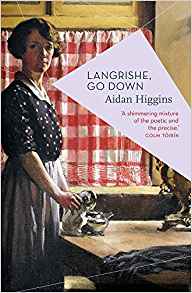Langrishe, Go Down
Set in Ireland in the 1930s, the novel basically focuses on a love affair between Ingrid Langrishe, an Irishwoman, and a German scholar named Otto—and that is really mostly that. Readers who are orientated towards plot and action should probably avoid this novel as they will be disappointed. Conversely, readers who enjoy powerful poetic language which lingers on description and the senses and who enjoy stream-of-consciousness writing and detailed exploration of the inside of a character’s head will probably love it. The style can be quite staccato at times and at other times more lyrical, ‘Dull matter. Dull days. Smell of decaying foliage. Voices. Dark before nine-thirty. The bed empty when I reach home. Where is he?’ (p. 266).
Imogen is the youngest of four sisters, a decaying Irish family fallen on hard times, but this is more for the dark atmosphere of poverty and loss rather than a plot conceit. Higgins plays with time and point of view. This is not a straightforward linear novel, but rather one which focuses on key and also mundane moments. The influences of Samuel Beckett and James Joyce are evident. The novel was also adapted for BBC television starring Jeremy Irons and Judi Dench.










